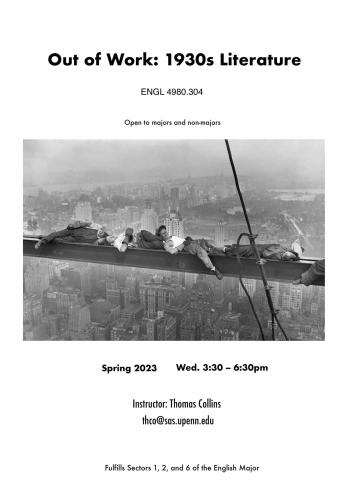Out of Work: 1930s Literature cancelled
The old, glittering world imploded in crisis: stock-market crash, hobos and Hoovervilles, sit-downs and walkouts, madcap zaniness and protest novels, labor action and state repression. The 1930s was an era of masses – mass unemployment, mass movements, mass culture – when writers transformed the techniques of literary modernism to forever change the world. Their efforts to move readers from contemplation to resistance went beyond simply representing conditions on the ground, and their formal interventions were intended to advance political struggle. But this was not only a moment of the avant-garde, as the mass media of film, radio, and pulp magazines reached wider audiences than ever before. What’s a better place than a movie theater to pass the time when you’re out of a job? The period in American history we most associate with scarcity was also one of fantasy. In this course, we will seek to understand what people saw in the fleeting images of the silver screen and the ephemeral pages of little magazines. In addition to novels, poetry, plays, and film, we will read literary and cultural theory that will allow us to consider how the art and literature of this period responded to its unique historical conditions and how it continues to resonate with our own. Texts for the course may include works by Charlie Chaplin, John Dos Passos, Langston Hughes, Tillie Olsen, Muriel Rukeyser, H.T. Tsiang, Margaret Walker, Orson Welles, and Richard Wright.

 Department of English
Department of English
